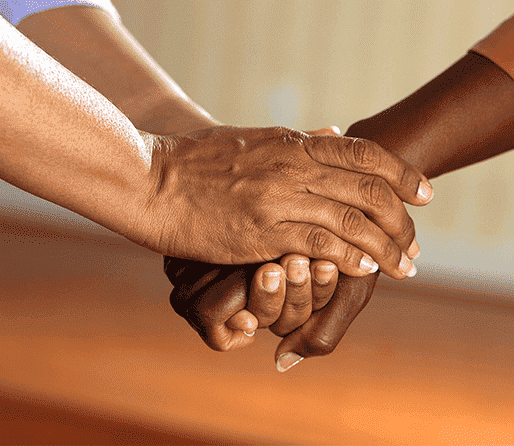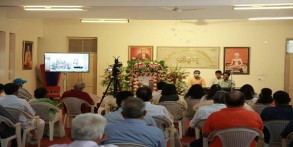Lastjourney Blog
What are some DOs and Don'ts after a death in a Hindu family?

 Table of Contents
Table of Contents- What you should do after the death of a family member in the Hindu religion?
- What you should not do after the death of a family member in the Hindu religion?
- Dos and don'ts after death in Hindu family for 1 year
- Questions that many of us have after death in the Hindu family
We all address the end-of-life journey as death. This difficult phase comes with unbearable pain and grief. But taking part in the death rituals with family members and friends lessens the pain a little bit.
When a family is performing last rites for honouring the departed soul, it must take care of some DOs and Don’ts after death according to the belief of that particular religion, caste and creed.
Read the complete article to know about everything you should do or not do after death in the Hindu religion.
What you should do after the death of a family member in the Hindu religion?
For convenience and a better understanding of the viewers, the entire information is depicted in a stepwise manner.
At the time of death –
If any person senses that his or her death is near, he/ she should be laid down on earth. A family member should place “Tulsi leaves” and sacred water or “Gangajal” in the mouth. It is believed that pouring water at the time of death helps the soul in attaining satisfaction and in getting rid of thirst. A person can also do these actions after the demise. Some people also put a particle of gold in the mouth of a deceased person. The deceased body’s head should face south direction and the legs must be north-facing.
At the time of funeral preparation-
After the death in a Hindu family, the funeral is the first ceremony that is performed by the family members. During the funeral, one must keep the following things in mind.
- The deceased body should be covered with a white cloth.
- The body should be placed inside a freezer box for safety.
- The family members can keep the dead body for 24 hours only to display it for visitors.
- The family members of a deceased person can embellish it with flowers and they can lighten some scented sticks near the head of the departed one.
At the cremation ceremony-
After keeping the deceased body for a limited time at the home, the close ones prepare it for the cremation ceremony. According to Hinduism, one must follow the below-mentioned points at the cremation ground.
- The older person of the family performs the cremation ceremony.
- Usually, the cremation places are near the river banks. Hence the elder person washes the body and wraps it with a clean white cloth. If a deceased person is married and female, it must be embellished with red clothes.
- The person participating in the cremation ritual should shave his head moustache and beard. Other family members should also do the same activity.
- The prepared body is placed on a wooden pyre and the elder person moves around the body in an anti-clockwise direction with a clay pot filled with water.
- After completing three rounds, the chief mourner drops the clay pot on the ground and fires the pyre.
The family members wait until the deceased body gets completely turned into ashes. After three days, the remains can be collected and flown into the sacred water or scattered over the ground.
What you should not do after the death of a family member in the Hindu religion?
There are several castes, creeds, sects and subsects in the Hindu religion and each one has a different and unique method of offering reverence to the departed person. But some common rules are followed in various sects of Hinduism like,
- After the demise of a beloved family member, the other persons of the family do not cook food for the entire day. They can take it from their neighbours and friends.
- The entire family should not wear new clothes for 13 days after the demise of the person. Any other kind of bodily beautification is also prohibited for 13 days.
- During this time period, the family should not offer puja or worship its ideals. They should not take part in any religious activity as well. The reason behind it is the family members are considered impure for these 13 days.
- After completing the cremation ritual, the family members should not look back toward the remains or ashes. It is believed that the departed soul tries to return with them due to emotional bonding.
- During these 13 days, all the family members feed themselves with simple food.
- At the funeral, visitors and family members should avoid wearing black. They can wear plain white clothes.
- Females should not participate in the cremation ceremony of the deceased person.
- During the funeral and cremation ceremony, nobody is allowed to consume food and drink like the other religion’s customs.
- After cremation, one should not collect the ashes immediately. The family members collect them in an urn after two or three days. These remains should not be brought to the home, instead, these must be flown in the holy water of a river or scattered over the plain ground.
Dos and don'ts after death in Hindu family for 1 year
In Hindu families, the period following a demise includes recognition of customs that can stretch out for as long as a year. This grieving period, known as "shraddha," incorporates different ceremonies and customs pointed toward respecting the departed and supporting the family through grief.
Dos during this time ordinarily incorporate performing normal day-to-day rituals and contributions (pinda daan) for the left soul, conducting demise functions, and taking part in alms distribution (daan) for the sake of the departed. These activities are accepted to help the spirit in its transition period towards moksha (freedom) and carry harmony to the family.
Don't include going to festivities like weddings, taking part in celebrations, buying new garments or jewellery, and abstaining from consuming non-veg food. These limitations are expected to recognize the piousness and satvikta at home and help the departed soul attain moksha. The drawn-out recognition of customs after death underlines respect for the elderly and understanding the younger ones, so that the grief can be shared equally.
Questions that many of us have after death in the Hindu family
Q.1 In which direction dead body should be kept?
Ans - In the event of death, a few customs are followed strictly to get comfort for the departed. From placing the departed in a particular direction to putting basil in the mouth, everything has a spiritual connection attached to it. As per Hindu rites and traditions, the head of the deceased should be in the south or west direction as if it is in the vice direction, then it has a chance to blend out within negative energies. The specific course might differ in light of local traditions and explicit family traditions A few communities may likewise consider factors, for example, the departed individual's age or status inside the family while deciding the direction of keeping Dead Body.
Q.2 Sutak rules for Family & relatives after death in Hindu Family?
Ans- "Sutak" refers to the time of custom followed by close relatives after the demise of a relative in Hinduism. This period is viewed as a period of grieving and reflection, during which certain practices are abstained to keep the house sacred and put the soul at peace. Normal sutak period starts from the day the person dies and is generally observed for 40 days, however in some communities, once the kriya ceremony is conducted Sutak is called off.
On the contrary, there are certain families which practice Sutak for one whole year and abstain from eating non-veg, consuming alcohol, attending marriages, getting their child married and many other rituals. The main reason for sutak is to give time to the immediate relatives for grieving and focus on the piousness in place so that the transition of the deceased can go smoother.
Q.3 Why not wash hair when someone dies in a Hindu Family?
Ans- In Hindu custom, washing the hair of immediate family members of the deceased is restricted. The roots of this custom lie in ancient folklore, which discusses that when death happens within the family negative energies become negative, and open hairs are home to negative energies.
They believed when the hair is washed amidst the mourning period, these negative energies become super powerful and cause distress in attaining moksha of the departed soul, resultantly that soul hangs between the two worlds and becomes a ghost. Since no one wishes to put their loved ones in the ghost genre, they pertain from activities that may disturb the energy level at home.
Q.4 Can we keep asthi after death?
Ans- After the demise of a person, one of the significant ceremonies is named asthi visarjan. This ceremony calls the male members of the people to visit the crematorium and collect the ashes after burning in a mud pot to conclude the ceremony with the visarjan of asthi in holy river or at a holy place according to the will of the person.
This is a practice that is conducted to contain the purity of the departed soul and assist him/her in attaining Moksha. Coming to an answer to whether can we keep asthi after death or not? Keeping asthi after death reflects negativity according to Hinduism, that is why as this is not even brought home, it is taken to sacred places from outside the home itself so that the spirit can attain moksha and can be free of taking birth again.
Q.5 What to eat after death in a Hindu family?
Ans- Since Hinduism follows Satvik Ahar during any sacred procession, death is no exception. People who belong to the family of the deceased, or who reach out to them to share grief are often offered satvik food. Meaning of Satvik food is when the food is prepared without the use of onion and garlic along with keeping vegetarian habits for a particular period.
The eldest son, who leads the procession eats first, and the rest of the family follows post he is done with his meals. The logic behind this is the Hindus firmly believe eating tamsik food (non-veg, onion, garlic) attracts negative energy at home, which could harm others too, hence the family sticks to satvik food and prayers so that an environment of peace and positivity could be created and the soul can rest in peace and the transition from materialistic world to the divine world could turn easier.
Q.6 Does a marriage need to be postponed after death in the family?
Ans- In Hindu culture, marriage in the immediate family after death is prohibited for at least one year. The first relatives are restricted from taking part in marriage processions, and mundane ceremonies of others as the family in grief does not wish to share their grief amongst others and spoil the festivities for others.
It permits close relatives to grieve without clashing feelings during a period of loss from their lives. It is believed that this time of grief is a time when people should stand by each other leaving behind any other festivity or celebration, and that's why marriage is generally postponed after death in the family.
Q- 7 Which festivals and celebrations are banned for 1 year after death in the family?
Ans- In varying cultures, a period of mourning occurs after the death of a family member, and it includes refraining from taking part in certain occasions for almost a year. This activity offers peace and respect to the deceased's family member’s soul.
For example, in Hindu tradition, the family does not celebrate festivals like Holi, Diwali, and Navratri for almost a year just to honour the departed soul. Other than that, marriage and mundane ceremonies are also prohibited during the first year post-death. If spoken about Jewish tradition, Yahrzeit, well-known as the death anniversary, is observed from maintaining a distance from festivals like weddings and other significant occasions.
This approach enables the family members to grieve appropriately, reflecting their loss. Refraining from celebrations maintains a balance between respecting emotions and honouring traditions. Muslims do not follow such rituals, however, Sikhism and Hindus follow almost the same tradition and ensure that celebration takes a halt during the minimum of first-year post-death of their relative.
Q-8 Is Intimacy or Sex after the death of a parent in Hinduism allowed?
Ans- In Hindu culture, intimacy after the death of a parent goes through emotional and spiritual layers. The departed soul’s journey toward liberation (moksha) enables others to honour their bond via certain rituals. This sacredness enhances physical presence, concluding with various rituals, including tarpan and shraddha, where offerings are made to embrace the deceased’s afterlife journey.
Prayers and meditation strengthen the connection, resembling gratitude and love towards the departed soul. In quiet moments, a parent's absence is felt in comforting memories. The cycle of life and death resembles intimacy into an eternal journey, especially in Hinduism. This connection and intimacy bridge the gap between divine and mortality, ensuring that the loved ones stay as a guiding light forever and assist us with making decisions herewith.
Q-9 Why should we not do pooja when someone dies in a Hindu Family?
Ans- Participating in festivals and Pooja after someone dies is not accepted as doing pooja during this tough period disrupts the piousness of the process. Besides this, it is believed that departed souls are supposed to face a transitional phase, and performing pooja rituals might disrupt the departed soul’s afterlife journey.
By refraining from pooja, members experience sanctity in the grievance procedure, which offers space for reflection and the flow of emotions respects the time of grief and allows them space so that the transition can take place smoothly.
Q- 10 Can we Keep the clothes of a dead person in Hinduism?
Ans- In Hindu culture, it is often seen that the clothes of a deceased person retain their memories and essence in a member's loved one's mind. So, these clothes are disposed of with dignity via burning or immersion into rivers or donating clothes to people in need, symbolizing the soul's release from worldly attachments. However, certain families keep traces of dead people's clothes in memory, which depicts their connection with the deceased.
This resembles comfort, which reminds us about the departed soul’s presence and afterlife. Keeping clothes offers deep reverence for the dead person with a belief in the cycle of life and death. This approach reflects the spirituality of letting go while respecting the departed soul’s continuity.
Hinduism does not support keeping the clothes of dead persons as it is also believed that when the old clothes of the deceased are worn again, the soul of the deceased tries to build a connection with the person who is wearing them, as a result, it is believed it brings inauspiciousness, Read the complete article to know more why you should not wear dead person's clothes.
Q- 11 Why do some people put gold in a dead person's mouth in Hinduism?
Ans- In ancient times, it was believed that placing gold in a dead person’s mouth symbolizes wealth and safe passage towards the afterlife. Gold signifies an individual's prosperity and status, enabling them to carry those traits into the next world. This activity shows the connection between spiritual and earthly prosperity, with gold as a sacred token of immortality.
Placing gold in a dead person’s mouth is believed to protect the soul from negative forces and offers an edge in the other world. Thus, it is believed that gold should be put in the dead's mouth before cremation, to make life smooth for them in the next world.
Q - 12 Can we Do House Warming Ceremony (Gruha Pravesham) after Death in a Hindu Family?
Ans- As we have discussed many of the questions that everyone has after death in Hindu families one of the common questions is can we do (Gruha Pravesham) or House Warming Ceremony after death occurs in family or relatives family? So the answer is no you should wait till the 10th or 13th day rituals are over the reason is after death as we have discussed in question 2 about sutak rules after death we can not do Puja so this is the main reason cause if do Hourse Warming we have to do Puja but we can not worship for at least 13 days, So the conclusion is we have to wait till 13 days rituals are over after that you can do Gruha Parvesham ceremony.
How Does Last Journey Guide you in following the guidelines related to the Dos and Don’ts after death in Hinduism?
Last Journey Funeral organization is popularly known for its method of organizing funerals and other final rituals. Our professionally skilled team performs their duties adhering to the faiths and beliefs of the deceased’s family. When a family hires our team for taking help in offering dignified death rituals to the departed soul, we provide them with an experienced priest/pujari/pandit Ji who enlightens the entire family with the appropriate way of performing last rites.
It is quite obvious to forget the actual customs and rituals when you have lost your loved one. In this time of confusion, a knowledgeable and well-read person (Pandit Ji) guides you and tells you what you should do at which place and when.
Our organization never imposes a certain set of rules on any mourning family. We empathetically participate in the grief of mourners and follow their instructions. We consider that honouring their customs and beliefs is the only way to calm their aching hearts.
Must Read Articles:-
Shraddha Rituals and Ceremonies after Death
Death Ceremony Invitation Messages
Difference between cremation vs burial vs Funeral
Your email address will not be published. Required fields are marked *












